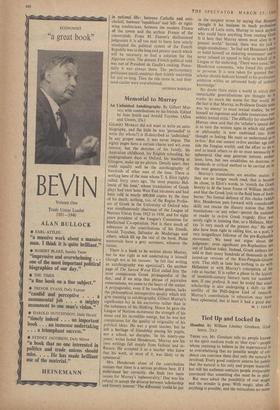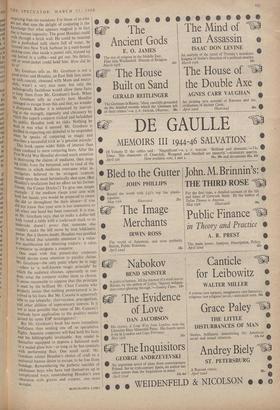Tied Up and Locked In
Houdini. By William Lindsay Gresham. (Gotlancz, 21s.)
THERE are, Mr. Gresham tells us, people known to the spirit medium trade as 'shut eyes'—people whose yearning to believe in the supernatural is so overwhelming that no possible weight of evi- dence can convince them that only the natural is involved. Every good conjuror assures his public that the natural is his only and proper material; but still his audience contains people irreparablY convinced that something else must be in play. But once admit the possibility of real magic and the wonder is gone. With magic, after all, anything is possible, and the miraculous no more surprising than the mundane. For those of us who _are not shut eyes the delight of conjuring is the k_nowledge that what appears magical is in fact due to human ingenuity. The great Houdini could walk through a brick wall. He could be inserted into a padlocked milk churn full of water, be lowered into New York harbour in a steel-bound Packing-case, shut inside a patent safe, trussed up acen.d buried in a coffin—and get out. No fetters,
11 or strait-jacket could hold him. How did he do je
Mr. Gresham tells us. Mr. Gresham is not a good writer and Houdini, an East Side Jew, eaten tiP with conceit, obsessed with Mom and necro- PhilYi wasn't a very nice man; but only the Pathologically fastidious would allow these facts tso. keep them from Mr. Gresham's book. When 1%1r- Gresham tells us exactly how Houdini Managed to escape from this and that, no wonder dissipated. Rather it is enhanced by marvel- ling at the strength, ingenuity and chicanery• by ,w.hich this superb conjuror tricked and befuddled dneispublic. Houdini took no risks. Nothing he • ai t in was what it seemed. Mr. Gresham is Justified in expecting our disbelief to be suspended
‘±ihen he speaks of conjuring as magic and describes a successful trick as 'a genuine miracle.' This book opens wider fields of interest than t_hose confined to mere conjuring feats. After the
First World War Houdini devoted much attention !0 destroying the claims of mediums, then reap- 'fig richly from the bereaved, and to read of the manners in which mediums overcame what in- vestigators believed to be stringent 'controls should open the most hermetically shut eyes. (But oudins revelations had no effect on his former triends, the Conan Doylcs!) To give one simple example: if the medium clasps your arm with both her hands, you would be prepared to swear she did so throughout the dark séance—if you did not know that your arm is too insensitive to tell when one hand has been removed. It is true, as Mr. Gresham -says, that to make a dollar-bill walk round a table with a cockroach stuck to its Underside doesn't prove that someone else couldn't make the bill move by true telekinetic 'O Wei'. But it throws doubt. Houdini was justified In his belief that scientific eminence is a value- less qualification for detecting trickery; it takes a conjuror to outguess a conjuror. One must wish that present-day conjurors would devote some attention to psychic claims. Mr. Gresham—the only point where he is cagy --refers to 'a well-known magic principle' by Which the audience chooses, apparently at ran- (1°m, what the conjuror wishes them to choose. It seems reasonable to suppose that this principle is used by the brilliant Mr. Chan Canasta who Properly insists that , nothing preternatural is in- volved in his feats. But Mr. Canasta is apparently able to use telepathy, clairvoyance, precognition, and other abilities of supersensory interest. Is it not at least possible that some of Mr. Canasta's methods have application to the positive results gained by some ESP investigators? -
But Mr. Gresham's book has more immediate Usefulness than sending one off on speculative flights. Amateur conjurors will find both his facts and his bibliography invaluable. Any reader is thereafter equipped to depress a balanced scale in a sealed glass box—so long as he has contacts With performing fleas. One small cavil: Mr. Gresham relates Houdini's choice of craft to a universal human desire to escape, to be free from bondage. Remembering the pathetic suicides of adolescent boys who have tied themselves up in coMplicated ways, remembering Houdini's own Obsession with graves and corpses, one must vvonder.
MARGI-IANITA LASK I



















































 Previous page
Previous page